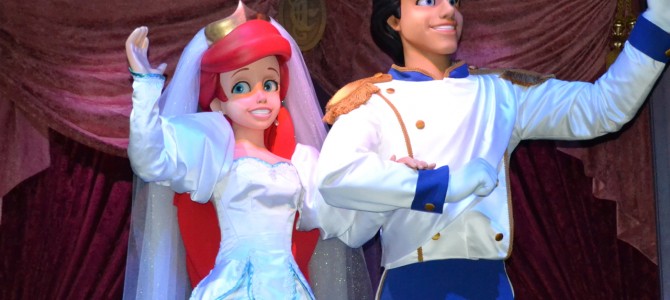
Numerous pieces have been written about the negative influence of Disney princesses on girls and how moms should spend inordinate amounts of time shielding their children from it. Before I had children, I had similar thoughts about how Disney destroys women and makes them mindless aspirants for marriage with the first Area Prince they meet. And that’s not to mention that Disney kingdoms never have a form of representative government. Of course, we don’t even like watching our own congress in action so I can imagine it would slow the plot down a bit.
I still grumble a bit when I have to sit through any part of The Little Mermaid but that’s mostly because I’ll have to hear the Ariel song that sounds like cats dying. And yes, I do wince a little at the preschooler dressed up like Ariel for Halloween because she looks a bit like a deranged midget hooker with a wig. But if it’s your little girl, it’s adorable. I get it. So maybe I haven’t made my peace with The Little Mermaid but that’s mostly because I’ve had to sew her cheap bikini top a hundred times so we aren’t carrying a naked Ariel around town.
The thing is, though, are we not doing the same thing to our girls by shaming and embarrassing them for enjoying princesses and the assorted girly accoutrements? That little girl in a Little Mermaid costume is happy and that’s why her parents let her leave the house looking that way. Girls have been having tea parties forever. Adding princess gear to the event merely formalizes the same ritual our society has been comfortable with for years. Girls gravitate to princesses because they like it. Why are we in the business of repressing gender preferences anyway? Kids have all sorts of strange ideas for future careers. My eldest daughter hasn’t claimed “princess” as a career but she did say she wants to be a “doggie protector.” The younger one loves pretending to be “Rapunzel” yet she hasn’t suggested to me that she sees a way to monetize that in her future. If loving the routine they do together to Frozen’s “Let It Go” is wrong, I don’t want to be right. The 2-year-old is particular to the foot stomping move that builds Queen Elsa’s ice castle and I find myself looking forward to each time she does it. Call me a monster, a sexist throwback, or a mom who isn’t protecting her kids from future bulimia because of the “small-waisted imagery” but I adore watching my daughters have fun.
Princesses stand out. They’re an aspiration. A glamorous figure that, while unobtainable, largely has purpose. If we shield people from glamorous figures because we don’t want them to be let down when they fail, what do we tell people really? Dream smaller, or don’t dream at all because you wouldn’t want to fail. Are we Princess Marxists? “From each according to her tiara, to each according to her glass slippers.”
This line of thinking strikes me as the mark of a society in decline. A society that spends its time hectoring a Barbie doll for false dimensions isn’t a society that’s aspirational – it’s one that’s decided to occupy its time with condemnation and retribution.
Beauty Matters
My next point will bother some people but I’ve become concerned with how we condone lying to girls and what it means for them. There is no changing the fact that beauty matters for both genders. While we aren’t all going look like Ava Gardner, Grace Kelly or Lupita Nyong’o, we are wrong when we lie to girls and tell them it won’t matter what they look like. It will and frankly if you don’t just accept that and do the work it takes to be the best version of yourself on the inside and outside, you will miss opportunities.
Men are visual creatures and if you had an inkling of wanting to have the maximum opportunity to meet a worthy partner it will not hurt that you look your personal best at the time. This doesn’t mean the-cover-of-Maxim best; it means dress-well-and-take-care-of-yourself best. It’s a fantasy that someone is going to see the real you before they even met you if you rank your health and appearance low. We should not lie to girls and tell them won’t matter when they start to be interested in finding a partner in life. Like it or not those “small-waist” princesses are just reflecting a scientific fact that men are attracted to a certain waist to hip ratio that aligns perfectly with women’s fertility. No amount of gender studies classes are going to reeducate your typical male into believing otherwise.
It does not aid women to mislead them on this point. If you want to encourage marriage as one of the best ways to escape poverty, you might want to be realistic about what ups your chances of getting and keeping a marriage working. As this study found in the Atlantic, “Attractive, Agreeable, and Clean people” are more likely to get married.
“Increasing the value of the personal traits index by one standard deviation is associated with a 13.7 percent greater hazard of entering into marriage for men and a 13.2 percent greater hazard of entering into marriage for women,” the study reads. “Though certainly not definitive, these results suggest that individuals may be able to trade-off different personal traits to enhance their competitiveness in generating offers and finding a suitable mate. The results also suggest they may be able to compensate for a deficiency in one desirable trait by enhancing the presence of another. For example, a person lacking in physical attractiveness may choose to invest more in grooming in order to become a more attractive partner.”
So the nice attractive, agreeable, clean princesses in Disney movies are the marrying type. This is true in the majority of life so we shouldn’t lie to girls and lend credence to what I dub the “Lena Dunham Double Standard.” The deal that all women must pretend that she is attractive else we are mean because we are pointing out the truth. We are not aiding Lena Dunham by feeding her narcissism and self involvement by going along with it.
Dunham thinks she’s the bee’s knees; she’s openly stated as much. And if you don’t agree then that’s obviously something for you to work out. It’s not her, it’s you. What’s more, you’re not allowed to offer criticism, only plaudits. That’s the implied deal: she should be afforded all manner of praise for her daring, but she should also be immune to any sort of judgment or questioning of the rationale behind why she chooses to bare all over and over again in a show where very few others are asked to do the same.
I’d like to offer that by shielding our girls from Princess Imagery, we are creating more Lena Dunhams not fewer. Girls, like everyone, shouldn’t shy away from self improvement or critical feedback. Ban Bossy was wrong-headed for the same reason. We should be raising girls tough enough to see a Disney princess and say she’s pretty and move along with their daily lives. We can’t do that by hiding them from her as a girl. As a woman you are going to run into millions of situations in life where you aren’t the funniest, most attractive, kindest, or best dressed woman in the room. It’s better to accept that as true and develop some resilience about it than to let it bother you.
My heart melts every time I see my 2-year-old amongst her preschool friends in the play yard just spinning away in her princess dress she insisted wearing on top of her outfit because she’s so clearly happy. In the end, that matters more to me than a hypothetical threat from a Pretend Princess.
Plus if you’re an American, the world has already decided that you are more fortunate and more attractive. Enjoy it.









